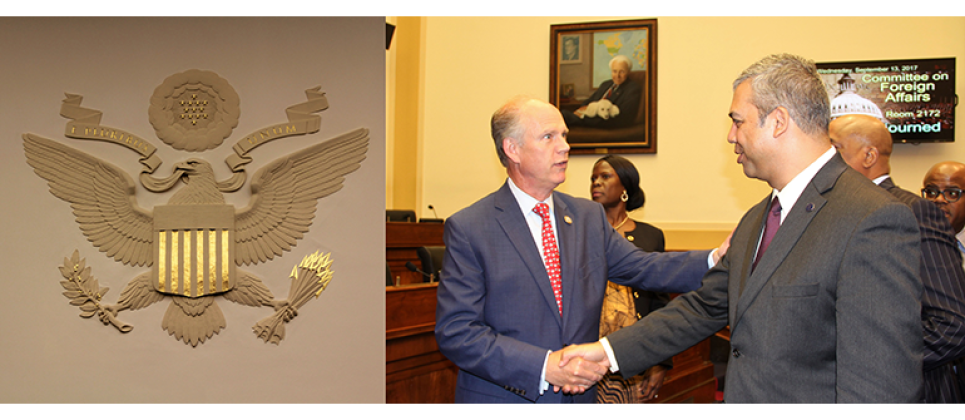
IFES Testifies on Capitol Hill on “The Future of Democracy and Governance in Liberia”
On September 13, 2017, International Foundation for Electoral Systems (IFES) Regional Director for Africa Rushdi Nackerdien provided testimony to the House Foreign Affairs Subcommittee on Africa, Global Health, Global Human Rights, and International Organizations on “The Future of Democracy and Governance in Liberia.”
Nackerdien’s oral testimony is below:
Mr. Chairman, Ranking Member Bass, and distinguished members of the Subcommittee: on behalf of the International Foundation for Electoral Systems, I deeply appreciate this opportunity to discuss the evolution of Liberia’s democracy. With generous backing from USAID and international partners, IFES supports credible electoral processes globally. In many parts of the world, including Liberia, IFES works with its Consortium for Elections and Political Process Strengthening partners – the International Republican Institute and the National Democratic Institute.
Mr. Chairman, credible elections strengthen peace and democracy. This is no truer than in Liberia. Twelve years ago, Liberia was emerging from a civil war that left hundreds of thousands dead, disabled or displaced—a war rife with the use of child soldiers and an epidemic of violence against women. The 2005 elections shattered a double glass-ceiling, leading to the first elected female head of state in Africa, and the first black woman head of state, Her Excellency Ellen Johnson-Sirleaf.
On October 10, 2017, Liberians will recommit to democracy. As Johnson-Sirleaf is ineligible to run for a third term – and should be congratulated for honoring her country’s constitutional term limits – this election will mark the first democratic transfer of political power in Liberian history.
IFES has implemented election programs in Liberia since 2004. Over time, our work has become more focused and nuanced. In 2005, Liberia’s National Election Commission (known as the NEC) leaned heavily on the UN Peacekeeping Mission and IFES. In 2011, it began standing independently. And in 2014, in the midst of the Ebola crisis, the NEC ably conducted Special Senatorial Elections.
This is progress, and relied on IFES’ support in several key areas, such as voter registration, results management, campaign finance, and electoral dispute resolution. Mr. Chairman, our efforts are yielding results. A recent survey found that 91% of Liberians feel free to choose whom to vote for, while 90% feel free to join any political organization. The NEC increased the voter register by 15% from 2014 to 2 million registered voters. With IFES support, the NEC registered 67% of young voters. A 2017 USAID-funded study found that the majority of Liberians interviewed trust the NEC as an impartial and transparent body.
In sum, without U.S. support, the Commission would be weaker, less prepared for the elections, less voters would be registered and would know about the process, and the October elections in Liberia would be more expensive. For instance, the Government of Liberia assessed the viability of biometric voter registration for the upcoming elections. IFES advised against its implementation prior to the coming elections, citing cost and logistical reasons. The Government agreed with our assessment, and did not attempt a premature or rushed implementation of new, untested technology. This is a clear example of how mutual trust built over time and adherence to local context leads to cost-effective and practical decisions that can stave off electoral mishaps.
Despite this progress, the NEC faces several challenges. Liberia’s road network, already unreliable, will lengthen the delivery and retrieval of electoral materials, during the height of the rainy season. The cadre of core election officials will depend on continued international support for both planning and implementation. A run-off election is a highly likely scenario. The NEC will have two weeks, after the announcement of 1st Round final results, for administering a run-off. This will strain their systems.
These challenges highlight the continued need for assistance. Which brings me, Mr. Chairman, to my recommendations for the U.S. Congress. Firstly, I thank the U.S. Congress for its robust, bipartisan funding of democracy assistance, and ask for its continued support. Electoral assistance, as evidenced by Liberia’s success, should start early and continue through the post-election period to allow for flexible and responsive programming. Multi-year, multi-election programs are the most impactful. In Liberia, we recommend continued support to a possible constitutional referendum, to the eventual introduction of biometric voter identification and registration, and to strengthen judicial capacities.
Mr. Chairman, thank you again for this opportunity to testify. The October 2017 elections will be a landmark achievement for Liberians, and we congratulate them in advance.
Along with Chairman Christopher Smith (R-N.J.) and Ranking Member Karen Bass (D-Calif.), the hearing was attended by Congressman Ed Royce (R-Calif.) and Congressman Daniel Donovan (R-N.Y.). Nackerdien was joined on the panel by Dave Peterson, senior director of Africa programs at the National Endowment for Democracy (NED); Aurelia Curtis, founder and executive director of the Weeks Educational and Social Advocacy Project; and Christopher Fomunyoh, Ph.D., senior associate and regional director for Central and West Africa at the National Democratic Institute (NDI). To read his written testimony, please click here. An archived video of the hearing is available on the House Foreign Affairs Committee website.










